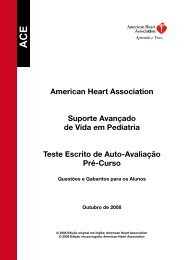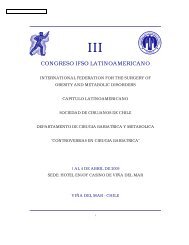Pediatric Clinics of North America - CIPERJ
Pediatric Clinics of North America - CIPERJ
Pediatric Clinics of North America - CIPERJ
Create successful ePaper yourself
Turn your PDF publications into a flip-book with our unique Google optimized e-Paper software.
BLOOD COMPONENT THERAPY<br />
441<br />
TRALI from TACO, an acute, nonimmune transfusion reaction that presents<br />
with respiratory distress, cardiogenic pulmonary edema, and hypertension<br />
resulting from volume overload. TRALI usually improves after 48 to 96<br />
hours from onset <strong>of</strong> symptoms, but aggressive respiratory support is required<br />
in 75% <strong>of</strong> patients and 10% to 15% <strong>of</strong> patients who have TRALI<br />
have a fatal outcome. Although patients who have TACO <strong>of</strong>ten respond<br />
to diuresis, patients who have TRALI may require fluid or vasopressor support<br />
in the face <strong>of</strong> hypotension, and diuretics should be avoided [52].<br />
Although the exact mechanism <strong>of</strong> TRALI remains uncertain, two not<br />
mutually exclusive hypotheses are proposed: the antibody-mediated hypothesis<br />
and the neutrophil priming hypothesis. According to the antibodymediated<br />
hypothesis, antineutrophil or anti–HLA I or II antibodies (from<br />
donor or recipient) attach to the corresponding antigen on neutrophils,<br />
causing sequestration and activation <strong>of</strong> neutrophils within the lungs, resulting<br />
in endothelial damage and vascular leakage. Many reports clearly document<br />
the presence <strong>of</strong> these antibodies in TRALI reactions [53]. In 85% to<br />
90% <strong>of</strong> the cases, the antibodies were present within the donor blood unit,<br />
whereas in approximately 10% <strong>of</strong> the cases, the antibodies were found present<br />
in the recipient. Leukoreduction <strong>of</strong> cellular blood products decreases the<br />
incidence <strong>of</strong> TRALI caused by recipient leukocyte antibodies to incompatible<br />
donor leukocyte antigens [6,52]. The neutrophil priming hypothesis is<br />
proposed to account for the cases <strong>of</strong> TRALI in which no antibody is identified.<br />
In this two-hit mechanism, the first event is the clinical situation<br />
within the recipient surrounding the transfusion, which primes neutrophils<br />
(eg, surgery, infection, or trauma). The second event consists <strong>of</strong> the transfusion<br />
<strong>of</strong> ‘‘bioactive factors,’’ such as cytokines, IL-6, IL-8, bioactive lipids (ie,<br />
lysophosphatidylcholines), or anti-HLA/antineutrophil antibodies, which<br />
produces neutrophil sequestration with the endothelium <strong>of</strong> the lungs.<br />
Some reports show that cases <strong>of</strong> TRALI in adults, in which antibodies<br />
were not identified in the donor or recipient, had less severe courses than<br />
those associated with antibodies [52,53].<br />
TRALI is reported as a consequence <strong>of</strong> all blood product transfusions;<br />
however, plasma products (FFP and FP) account for the majority (50%–<br />
63%) <strong>of</strong> TRALI fatalities [52,53]. TRALI is reported in pediatric patients,<br />
albeit in a limited number <strong>of</strong> case reports. High-risk pediatric populations<br />
consist <strong>of</strong> those with hematologic malignancy, post–bone marrow transplant,<br />
and autoimmune disorders. In the largest epidemiologic study on<br />
TRALI, which included 15 pediatric patients, the most common setting surrounding<br />
the reaction in children was induction chemotherapy for acute<br />
lymphoblastic leukemia [54]. There are no definitive cases <strong>of</strong> TRALI documented<br />
in the neonatal population.<br />
Recent data from the United Kingdom’s serious hazards <strong>of</strong> transfusion<br />
initiative and the <strong>America</strong>n Red Cross have shown that the majority <strong>of</strong><br />
TRALI cases resulting from high-volume plasma products (FFP and apheresis<br />
platelets) involved an antileukocyte antibody-positive female donor





